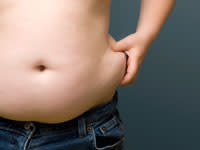Is it baby fat—or obesity?

By Sarah Klein
Desani Marshall was never really overweight, but she was always a little big for her age. During a checkup at age 4, her doctor pointed out to her mother that Desani was gaining weight more rapidly than he thought was normal. Six months later, she was still putting on pounds at a rapid pace-a strong predictor of future obesity.
"I didn't take it seriously; I didn't think it was that bad," says Desani's mother, Caryl Marshall, of New York City. "But then he showed me the growth chart. At the rate she was gaining, what really made me take it more seriously was what the future could be."
Now 7, Desani is gaining weight at a normal pace, thanks in part to dietary changes-such as cutting out soda-that Marshall has implemented. "Everybody would look at her and say, 'She's so skinny. Why?'" Marshall says of her daughter's regimen.
Health.com: 10 habits of healthy families
In some ways, Desani's success story is an exception. Across the country, childhood obesity has only gotten worse. More than 20 years after it was first described as an epidemic, 17% of American children and adolescents are obese-triple the rate in 1980-and nearly one-third are overweight, according to the latest government data. Alarming statistics such as these have prompted government agencies, schools, and nonprofit organizations to launch a barrage of anti-obesity programs in recent years.
Their sense of urgency is not shared by all parents, however. In fact, studies have consistently shown that parents tend to underestimate their child's weight and the health risks associated with being too heavy. In a 2006 study that surveyed the parents of obese children, only one-half recognized that their child was overweight, and less than one-third said they were "worried" about their child's weight. In another survey, only 38% of parents had taken steps, or were planning to take them, to help their obese child lose weight.
Health.com: 5 tips for staying active with kids
Several factors may be contributing to this indifference among parents, experts say. Some parents believe their child's excess weight is just "baby fat," for instance, and some may simply be in denial. Or it could be that parents have concluded their kid is normal after eyeballing his or her overweight peers.
"Because so many children are overweight and obese…they don't stand out as much as they would have 20 or 30 years ago," says nutritionist Elisa Zied, a registered dietitian and spokesperson for the American Dietetic Association. "I almost see a lack of concern with some parents."
Health.com: 8 reasons to make time for family dinner
Parents should be concerned. Although some overweight kids do outgrow their baby fat, roughly two out of three are likely to grow up to be obese adults, according to a 2009 study by the U.S. Centers for Disease Control and Prevention (CDC). Childhood obesity, moreover, is associated with a slew of serious health problems, including diabetes, asthma, heart disease, and depression.
How do you know if your child's chubbiness is baby fat or a serious health problem? You can't always tell just by looking, and you can't always count on pediatricians to broach the subject. But you can take matters into your own hands and adopt habits that will keep your child as healthy as possible.
Continue reading Is it baby fat-or obesity?
